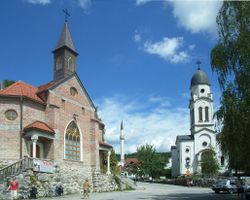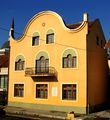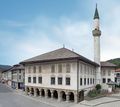الدين في البوسنة والهرسك
الأديان في البوسنة والهرسك (2013)[1]
| جزء من سلسلة عن |
| ثقافة البوسنة والهرسك |
|---|
 |
| التاريخ |
| الأعياد |
| الدين |
|
|

The State Constitution of Bosnia and Herzegovina (BiH) and the entity Constitutions of the Federation of Bosnia and Herzegovina and the Republika Srpska provide for freedom of religion, and the Government generally respects this right in ethnically integrated areas or in areas where government officials are of the majority religion; the state-level Law on Religious Freedom also provides comprehensive rights to religious communities. However, local authorities sometimes restricted the right to worship of adherents of religious groups in areas where such persons are in the minority. 54% of Herzegovinian and Bosnian Muslims consider themselves as "just muslims".[2]
Government protection of religious freedom declined, especially during the campaign period prior to the October 2006 national elections, due to selective legal enforcement and the indifference of some government officials. At the end of the period covered by this report, the Government was implementing the State Law on Religious Freedom to protect the rights of religious communities and create a government registry allowing them to establish legal status.
Societal abuses and discrimination based on religious belief and practice persisted. Religious intolerance directly reflected ethnic intolerance because of the virtually indistinguishable identification of ethnicity with religious background. Discrimination against religious minorities occurred in nearly all parts of the country. In some communities local religious leaders and politicians contributed to intolerance and an increase in nationalism through public statements and sermons. A number of illegally constructed religious objects continued to cause ethnic/religious tension and conflict in various communities. Religious symbols were often misused for political purposes.
In a 2009 Gallup poll, 77% of respondents in Bosnia and Herzegovina answered 'yes' to the question "Is religion an important part of your daily life?", while 21% responded negatively.[3] According to a 2017 Pew Research poll, 31% of Bosnian Muslims, 10% of Orthodox and 54% of Catholics attend religious services at least once a week.[4]
المواقع الدينية في البوسنة والهرسك
مسجد، Počitelj، بني في 1561
مسجد، موستار، من القرن 17
Krupa Monastery, near Banja Luka
Church of St. Catherine (Grude)
Moštanica monastery, near Kozarska Dubica
كنيس في دوبوي
Church of St. Peter and Paul (Mostar)
Mosque in Travnik
انظر أيضاً
- الإسلام في البوسنة والهرسك
- Eastern Orthodoxy in Bosnia and Herzegovina
- Roman Catholicism in Bosnia and Herzegovina
- Protestantism in Bosnia and Herzegovina
- Judaism in Bosnia and Herzegovina
- Bahá'í Faith in Bosnia and Herzegovina
- Hinduism in Bosnia and Herzegovina
المراجع
- ^ "Archived copy". Archived from the original on 2016-08-15. Retrieved 2016-06-30.
{{cite web}}: CS1 maint: archived copy as title (link) - ^ {{{author}}}, Chapter 1: Religious Affiliation. The World’s Muslims: Unity and Diversity, [[{{{publisher}}}]], August 9, 2012.
- ^ "World - Gallup Topic". Gallup.com. Retrieved 4 January 2018.
- ^ "Final Topline Religious Belief and National Belonging in Central and Eastern Europe" (PDF). Assets.pewresearch.org. Retrieved 4 January 2018.
المصادر
- Živković, Tibor (2012). De conversione Croatorum et Serborum: A Lost Source. Belgrade: The Institute of History.
{{cite book}}: Invalid|ref=harv(help) - Živković, Tibor (2013). "On the Baptism of the Serbs and Croats in the Time of Basil I (867–886)" (PDF). Studia Slavica et Balcanica Petropolitana (1): 33–53.
{{cite journal}}: Invalid|ref=harv(help)
وصلات خارجية
- United States Bureau of Democracy, Human Rights and Labor. Bosnia and Herzegovina: International Religious Freedom Report 2007. This article incorporates text from this source, which is in the public domain.













